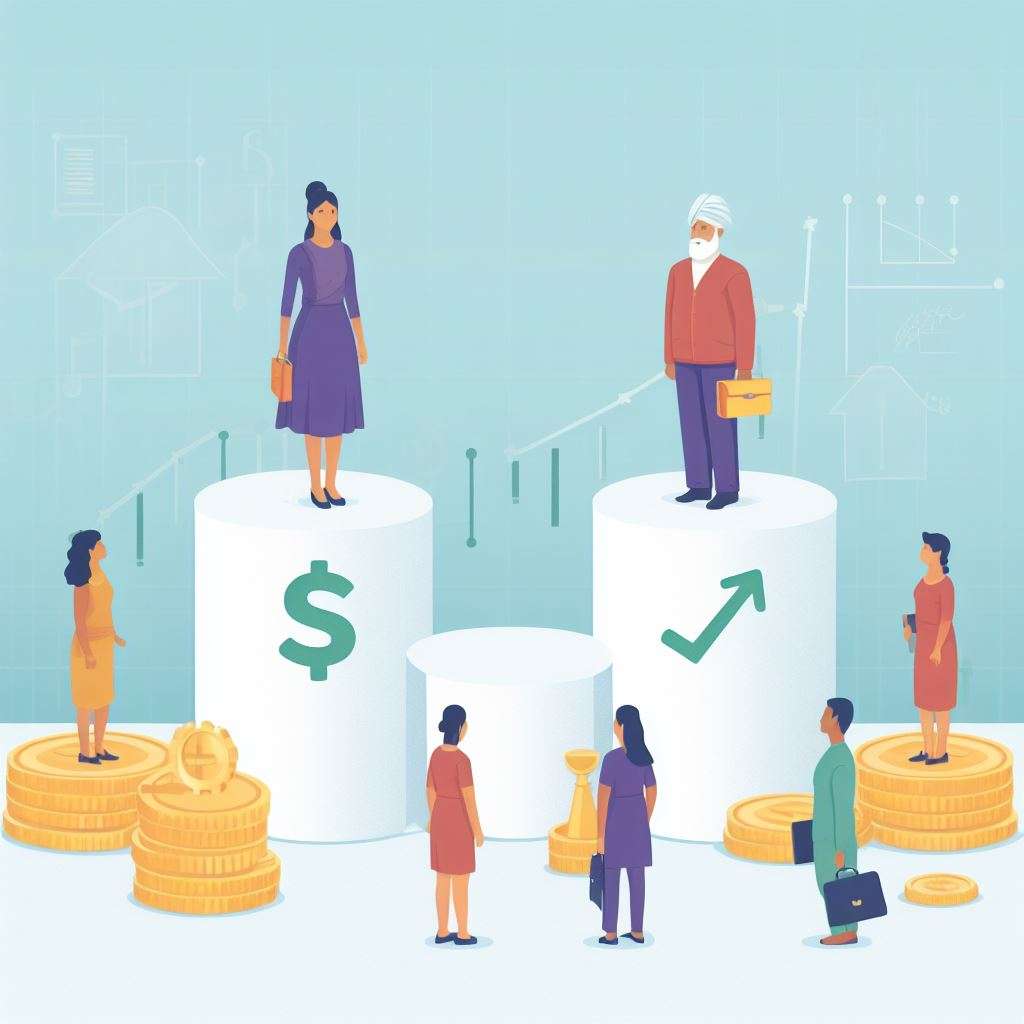I. Introduction
Economic development plays a crucial role in shaping societies by driving progress, improving standards of living, and creating opportunities for individuals to achieve their dreams. In this article, we will explore the intricate pathways that lead to economic development, recognizing the profound influence of dreams as a catalyst for growth.

II. Understanding Economic Development
At its core, economic development refers to the sustained growth of a nation’s economy and its ability to uplift the well-being of its citizens. Key indicators of economic development include per capita income, employment rates, literacy levels, and access to basic healthcare. As we delve deeper, we realize that economic development is intricately linked to the quality of life experienced by individuals within a society.

III. Historical Perspectives on Economic Development
Throughout history, various theories have emerged to explain economic development and its impact on societies. Early theories, such as the Classical and Neoclassical models, highlighted the role of capital accumulation and market forces. However, these theories had limitations in addressing the complexities of development. The Industrial Revolution then exerted a profound influence on economic development by introducing mass production and technological advancements.
Over time, shifts in development theories occurred, with a growing recognition of the importance of human capital, innovation, and sustainable practices in driving economic growth.

IV. The Drivers of Economic Development
Several factors act as the driving forces behind economic development. Human capital development through education plays a critical role in equipping individuals with the necessary knowledge and skills to contribute to economic growth. Furthermore, investments in infrastructure, such as transportation networks and communication systems, provide the essential foundation for economic development. Technological advancements and innovation fuel productivity and efficiency gains, while access to finance and investment fosters entrepreneurial initiatives and business expansion.

V. Approaches to Foster Economic Development
Governments play a pivotal role in promoting economic growth by implementing policies and initiatives that facilitate development. Public-private partnerships offer a collaborative approach, leveraging the strengths of both sectors to drive economic progress. Market-oriented policies, characterized by deregulation and increased competition, create a favorable business environment that attracts investments and stimulates growth.
VI. Economic Development and Sustainable Development Goals
Economic development aligns closely with the United Nations’ Sustainable Development Goals (SDGs), which aim to address global challenges while fostering sustainability. By balancing economic growth with social equity and environmental conservation, economic development contributes to the achievement of these goals. Embracing sustainable practices ensures that the benefits of development are shared across generations.
VII. Case Studies: Successful Economic Development Models
Several countries have showcased remarkable economic development models. One prominent example is Singapore, which transformed from a small port city into a global economic hub through strategic planning, investment in education, and visionary leadership. Likewise, South Korea’s rapid ascent as an economic powerhouse can be attributed to its focus on technology, innovation, and export-oriented industrialization. Scandinavian countries, known for their welfare states and high levels of social equality, have established sustainable development models that prioritize well-being and inclusive growth.
VIII. Challenges and Obstacles to Economic Development
Despite the progress achieved, challenges persist on the path to economic development. Income inequality remains a significant hurdle, as it hampers social mobility and undermines the sustainability of economic growth. Political instability disrupts economic activities and deters foreign investments, impairing overall development efforts. Corruption further exacerbates these challenges, eroding trust, impeding efficient resource allocation, and deterring foreign investors. Moreover, global economic disparities create imbalances and hinder the progress of developing economies.
1. Infrastructure Deficiency
Infrastructure serves as the backbone of any thriving economy. Be it transportation networks, energy grids, or digital connectivity, a deficiency in infrastructure can severely hamper economic development. Developing nations often struggle with inadequate roads, ports, and power supply, while even developed countries face the challenge of maintaining aging infrastructure. Investments in infrastructure development are essential to ensure smooth trade, efficient production, and access to global markets.
2. Education and Skill Gaps
A well-educated and skilled workforce is the cornerstone of economic progress. However, disparities in education and skill levels persist, preventing many individuals from participating effectively in the job market. Inequalities in educational opportunities must be addressed to bridge these gaps. Furthermore, promoting lifelong learning and vocational training can empower individuals to adapt to evolving job demands.
3. Political Instability and Corruption
Political instability and corruption pose significant threats to economic development. Unstable governments and corrupt practices deter foreign investments, disrupt business operations, and erode public trust. It is imperative for nations to cultivate transparent governance, strengthen institutions, and uphold the rule of law to foster a conducive environment for economic growth.
4. Access to Capital and Credit
Access to capital is a critical determinant of economic development. Small and medium-sized enterprises (SMEs), in particular, face challenges in obtaining financing to expand their operations. Policymakers should focus on creating mechanisms that enable easier access to credit for businesses, thereby stimulating entrepreneurship and fostering economic growth.
5. Income Inequality
Income inequality is a pervasive issue that can hinder economic development on multiple fronts. High levels of inequality can lead to social unrest, reduced consumer demand, and unequal access to essential services. Implementing progressive taxation policies and social safety nets can help mitigate income inequality and promote inclusive growth.
IX. Inclusive Economic Development
Inclusive growth is vital for sustainable economics development as it ensures that the benefits of progress are accessible to all segments of society, leaving no one behind. Measures must be taken to break down barriers and provide equal access to opportunities, particularly for marginalized groups. Investing in education, skills development, and social protection programs can empower individuals and promote a more inclusive society, thereby fueling economic growth.
X. Globalization and Economic Development
Globalization has reshaped the economic landscape, offering opportunities and challenges for developing countries. While it opens doors to expanded markets and increased capital flows, it also exposes economies to intensified competition and potential vulnerabilities. Developing countries must navigate this globalized world by leveraging their comparative advantages, fostering innovation, and establishing strategic partnerships to maximize the benefits of globalization while safeguarding their own economic interests.
XI. The Role of Entrepreneurship in Economic Development
Entrepreneurship serves as a powerful driver of innovation, productivity, and economic growth. Governments can promote entrepreneurship by implementing policies that encourage business startups, providing access to financing, and fostering a supportive ecosystem. Supporting small businesses, which are often key drivers of employment and local development, is crucial in nurturing entrepreneurial activities and driving economic progress.
XII. Technology and Economic Development
Technology plays a transformative role in propelling economic growth by enhancing productivity, efficiency, and competitiveness. However, the digital divide, characterized by unequal access to technology and information, poses challenges for developing countries. Bridging this gap requires investments in infrastructure, education, and digital literacy programs, ensuring that technology becomes an inclusive tool for economic development.
XIII. Sustainable Development and Economic Growth
The concept of the circular economy offers immense potential for sustainable economic development. By minimizing waste and maximizing resource efficiency, this model promotes growth while reducing environmental impacts. Achieving a balance between economic growth and environmental conservation is crucial for the long-term well-being of societies and the preservation of natural resources.
XIV. Cultural and Creative Industries as Catalysts for Development
Cultural and creative industries have emerged as powerful drivers of economic growth, job creation, and innovation. Countries can foster the growth of these sectors by implementing strategies that enhance cultural preservation, support creative entrepreneurship, and encourage collaborations between the arts and business communities. Embracing the economic potential of cultural diversity fuels development and enables societies to thrive.
XV. Investment in Human Capital and Economic Development
Investing in human capital is essential for sustainable economic growth. Education and skills development equip individuals with the tools they need to participate actively in the economy, foster innovation, and drive productivity gains. Additionally, investing in healthcare and well-being enhances the overall quality of human capital, fostering a healthier, more productive workforce that contributes to economic development.
XVI. The Role of Foreign Direct Investment in Economic Development
Foreign direct investment (FDI) brings benefits such as capital inflows, technology transfer, and access to new markets. Developing countries can attract FDI by offering an enabling business environment, implementing transparent regulations, and providing necessary infrastructure. Engaging in strategic partnerships and leveraging FDI effectively can amplify its impact, promoting economic growth and development.
XVII. Promoting Regional Economic Development
Regional economic integration offers numerous benefits, including increased trade, shared resources, and collaborative development initiatives. Successful regional development models, such as the European Union, have demonstrated the potential of regional cooperation in driving economic progress. By establishing common goals, pooling resources, and promoting connectivity, countries can unlock the synergies of regional economic integration and propel development.
XVIII. Infrastructure Development: Building the Foundations for Economic Growth
Infrastructure development forms the backbone of economic growth. Efficient transportation systems, reliable energy networks, and robust communication channels facilitate the movement of goods, services, and ideas, stimulating economic activities. Financing infrastructure projects effectively, through mechanisms like public-private partnerships and sustainable funding models, ensures the effective implementation and maintenance of critical infrastructure.
XIX. Conclusion
Economic development is a multifaceted endeavor that requires comprehensive strategies and stakeholder collaboration. By prioritizing sustainable and inclusive development, societies can navigate the complexities of economic growth while safeguarding the well-being of their citizens and the environment. Fueling dreams and boosting economies must go hand in hand to create a prosperous and equitable future for all.
XX. FAQs
What is the relationship between economic development and poverty reduction?
Economic development, through sustained growth and increased opportunities, can contribute significantly to poverty reduction by lifting individuals out of poverty and improving overall living standards.
How do governments promote economic development?
Governments promote economic development by implementing policies that foster an enabling business environment, investing in infrastructure, supporting education and skills development, and attracting both domestic and foreign investments.
What are some key drivers for innovation and technological advancements in developing countries?
Key drivers for innovation and technological advancements in developing countries include investments in research and development, building strong educational systems, fostering a culture of entrepreneurship, and creating supportive regulatory frameworks.
How does corruption hinder economic development?
Corruption undermines economic development by diverting resources meant for public investments and services, creating inefficiencies, discouraging investments, distorting markets, and eroding trust in institutions.
Can economic development be achieved without compromising the environment?
Yes, economic development can be achieved without compromising the environment by embracing sustainable practices, promoting the circular economy, investing in clean technologies, and prioritizing environmental conservation as an integral part of development strategies.

